The Blue Diamond - May 2021

CONTENTS AT A GLANCE:
- Introduction
- ACM OPEN: An Update on ACM's Transformative Open Access Model
- Plan S Update
- Collection of ORCIDs from All ACM Authors
- Peer Review Task Force Findings
- Introducing ACM Focus: A New Way to Experience the Breadth and Variety of ACM Content
- Ethics/Plagiarism Update
- PACM PL Listed in Emerging Science Index
- 2020 Journal Submission Trends
- ACM Computing Surveys Increases Issue Frequency
- ACM Artifact Evaluation Badges Gain Traction
- ACM TIST Seeking New Editor-in-Chief
- ACM Publications Welcome New Editors-in-Chief
Introduction
Welcome to the May Issue of the Blue Diamond newsletter. In this issue, you'll find information and updates on various ACM Publications-related initiatives, including updates on several of the more high-profile initiatives we've been working on that continue to have a significant impact on the computing community, including our progress with ACM OPEN, ACM's transformative model for Open Access publication; ACM Focus, a new way of serving up Digital Library content; and a more general update on the work overseen by ACM's Publication Ethics and Plagiarism Committee over the past few years.
As always, if you have any questions, comments, or requests related to any aspect of ACM Publications initiatives, please don't hesitate to reach out to me directly at the email address provided below.
Sincerely,
Scott Delman
Director of Publications
Email: [email protected]
ACM OPEN: An Update on ACM's Transformative Open Access Model
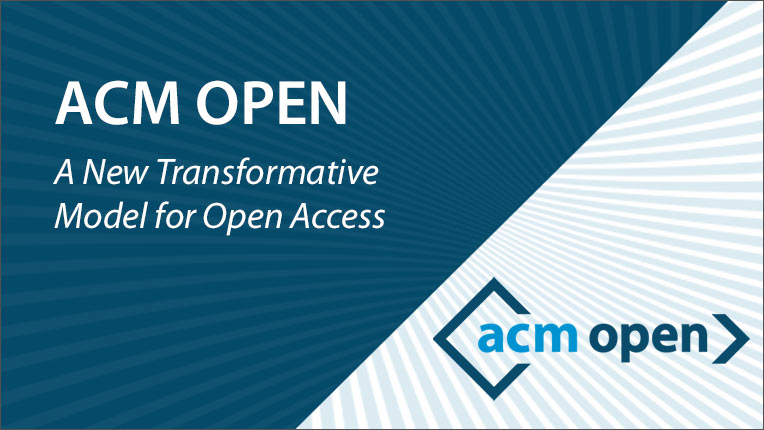
The initial pilot for ACM OPEN was launched at the end of January 2020 with multi-year agreements with the University of California, Carnegie Mellon University, MIT, and Iowa State University. Since then, ACM staff members have conducted over 150 webinars and Zoom presentations for institutions interested in learning more about ACM's new model, and to date ACM has signed multi-year agreements with approximately 90 institutions from the Americas, Europe, Middle East, Africa, and Asia, with hundreds of additional institutions currently evaluating the model.
In total, these institutions represent approximately 10% of the research articles ACM publishes annually and in addition to the 3-4% of research articles published on an Open Access basis via author-paid Article Processing Charges (APCs), over 13% of all ACM-published research articles annually are now being published with Open Access in the ACM Digital Library platform. Our goal is to achieve 100% sustainable Open Access publication by the end of 2025, and while ACM is off to an excellent start, achieving this goal will depend heavily on the willingness and ability of our authors' institutions to sign on to the ACM OPEN model over the coming years.
ACM would like to thank the international academic and scientific community for the overwhelmingly positive support shown for ACM OPEN since its inception. We encourage those institutions considering joining the program to sign on; the sooner we can bring the long tail of institutions with faculty and students into the ACM fold, the sooner ACM authors will experience the many benefits of Open Access publication, including increased visibility, distribution, and impact of their work.
An updated list of ACM OPEN institutions may be found here. ACM is thankful to this pioneering group of institutions for their commitment to an Open Access future. If you are interested in learning more about ACM OPEN for your institution, please contact us at [email protected].
Plan S Update
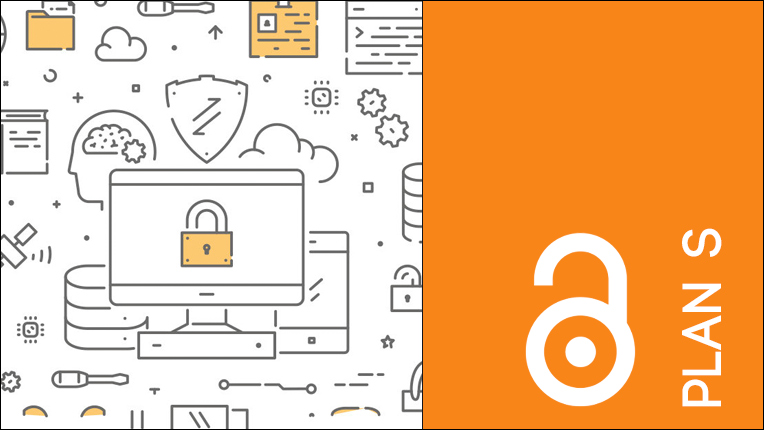
In November 2020, Coalition S, the coalition of research funders responsible for Plan S, launched a Journal Tracker Tool to help researchers subject to Plan S's Open Access mandates determine whether they will be compliant when publishing their work with a specific journal or publisher. Coalition S also established a set of requirements for journals and publishers to be listed as either a Plan S-compliant journal or publisher. ACM applied for and has received "Plan S-compliant" publisher status, making it one of only 10 publishers listed on the Plan S site. A complete list of those publishers and their journals can be found here.
ACM's conference publications are also Plan S-compliant; however currently there is no similar tool like the Journal Tracker Tool to track conferences, so we are working with the leadership of Coalition S to indicate Plan S compliance for ACM conferences on their site. It is our expectation that this will happen in the coming months.
If you are an ACM Author, you are now assured of being compliant with Plan S requirements when you publish with ACM.
Collection of ORCIDs from All ACM Authors
Last fall, the ACM Publications Board took the bold decision to start requiring all ACM authors to register and provide ACM with valid Open Researcher and Contributor IDs-widely known as ORCIDs-as part of ACM's publication process.
ORCIDs offer a host of benefits to authors, including ensuring research output is correctly attributed and credited, increasing the visibility of published works, and improved normalization of author and institutional affiliation data.
For the computing community as a whole, widescale use of ORCIDs in all ACM publications will also help to lay the groundwork for a range of new services ACM will provide, such as enhanced improved Digital Library profile data, improved detection of undeclared conflict of interest, plagiarism, and other publications-related misconduct.
Late last year, the ACM Publications Board approved a plan to implement this requirement for all ACM publications gradually over the course of 2021 and 2022, with all ACM journal authors having this requirement in place by the end of 2021 and all ACM conference authors by the end of 2022. At the April 30, 2021 ACM Executive Committee meeting, ACM's SIG Governing Board Chair, Jens Palsberg, gave his support for this initiative on behalf of the SIG Governing Board.
ACM recognizes and appreciates that this requirement will add a step for all ACM authors in the publication process, but ACM is convinced that the benefits of implementing this mandate at scale for ACM's more than 20,000 published papers annually will far outweigh the downside for authors.
Peer Review Task Force Findings
In 2019, the ACM Publications Board created a Peer Review Task Force to quantify and qualify the challenges that ACM (and many societies and scholarly publishers) has been experiencing relating to peer review, such as:
- identifying qualified and willing reviewers for submissions
- increasing wait time from initial submission to decision
- potentially decreasing quality (and resulting benefit) of reviews
The Task Force worked with specialized consulting firm, Kaufman Wills Fusting & Company, on in-depth market research. This work included interviews with innovative STM publishers and societies to identify approaches to improve reviewer participation and quality; scans of existing research on peer review trends; and an in-depth survey of ACM members, reviewers, and authors. ACM staff used the findings of this research to create a concise list of recommendations for the Publications Board's consideration in the areas of policy, education, and systems improvement, out of which we are developing a short list of priorities to implement over the course of 2021.
Some of the ideas we are exploring include:
- creating an educational reviewer gateway that includes reviewing best practices and guidance for implementing double-blind peer review;
- trialing a change in the number of peer reviewers from three to two on select publications;
- trialing open reviews (where the author and reviewer are known to one another);
- developing a proprietary ACM reviewer database, ensuring that interested and qualified reviewers are invited to review; and
- investigating submission system improvements to ease the operational challenges of peer review.
Introducing ACM Focus: A New Way to Experience the Breadth and Variety of ACM Content
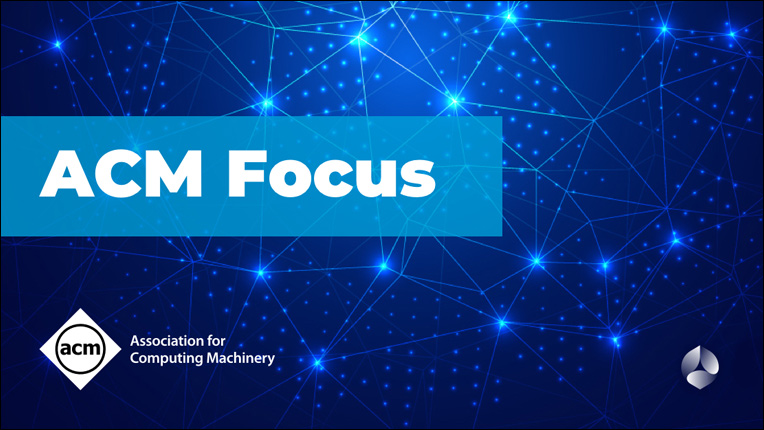
ACM Focus consists of a set of high-level subject area feeds of original and curated content that provide overall awareness of relevant ACM activities, published works, people, talks and news. ACM Focus serves as a single point of discovery to help technical communities realize how much ACM has to offer and to help them stay current within their areas of focus.
ACM Focus feeds are curated using machine learning to understand the content and users' interests and provide an engaging flow of relevant data. The experience can be customized even further through interaction, enabling individuals to create feeds that are more tailored to their interests. Look for the "Personalize ACM Focus" button at the top of the feed.
To power these machine learning feeds, ACM has teamed up with Atypon and their Scitrus platform. Scitrus is a discovery platform intended to help connect researchers and practitioners to the content they need without having to look for it. Current topic areas are Artificial Intelligence; Information Systems; the Web; Society and the Computing Profession; Applied Computing; Graphics and Computer-Aided Design; Networks and Communications; Architecture; Hardware; Human-Computer Interaction; Security and Privacy; Software Engineering and Programming Languages; and Computational Theory.
Stay current with the latest trends in your technical community. Take a moment to explore ACM Focus today.
Ethics/Plagiarism Update
As the world's leading computing society, preserving the integrity of the scientific process is very much at the core of ACM's mission, so much so that ACM introduced, maintains, and periodically updates the ACM Code of Ethics and Professional Conduct, recognized as the global standard for evaluating ethical and professional conduct for the computing community.
In response to a significant increase in the number of claims of publications-related misconduct over the past decade, the ACM Publications Board established the Ethics + Plagiarism Committee to investigate and adjudicate such claims.
The E+P Committee has become one of the most active of the Publications Board committees and ACM has invested heavily in related tools and services to facilitate investigations and administer penalties related to cases of proven misconduct.
The most serious ethics/plagiarism violations involve falsification of research and other forms of research misconduct; coercion and harassment-related misconduct; undeclared conflicts of interest and related misconduct; and peer reviewer-related misconduct.
Those found guilty of such violations face severe consequences that will likely have a tangible impact on their professional careers. Over the coming months, ACM's Publications Board will be conducting a thorough review of all ACM publications policies, especially those related to the most serious types of potential misconduct. As our policies are updated, we will communicate changes to the broader ACM community.
If anyone in the community feels that a violation of ACM Publications Policy has taken place, including plagiarism of a published ACM Work, please visit the ACM violations webpage, complete the online web form to report the potential violation, and contact ACM's Director of Publications once you have taken these initial steps if you have questions.
PACM PL Listed in Emerging Science Index
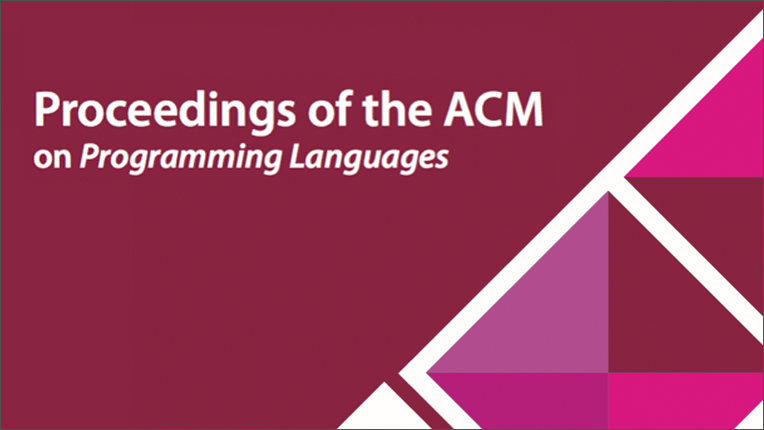
We are very pleased to announce that the Proceedings of the ACM on Programming Languages has been accepted into the Emerging Sources Citation Index (ESCI), which is part of the Web of Science platform. ESCI was launched by Clarivate Analytics in 2015 and serves as a precursor to inclusion in the Science Citation Index Expanded (SCIE), which is the index that generates Impact Factors for eligible journals. Once a journal is accepted into ESCI, its citation data is tracked, and it is considered for acceptance into SCIE when it is ranked in the top half of journals in its subject category. Upon receiving the formal acceptance letter for PACMPL, expected in April, we will have additional details about its subject classification.
The significance of including PACMPL in the ESCI is that Clarivate is now officially treating the publication as a journal. This is a major milestone, as it was a key goal when ACM launched the journal-first PACM model in 2017. Clarivate is also considering other PACM titles for inclusion in ESCI, and they are in various stages of evaluation.
2020 Journal Submission Trends
Submissions to ACM journals have been increasing over the years. However, since the onset of the pandemic, these increases have continued at an even higher rate. For instance, submissions from 2018 to 2019 increased by 18%. However, the increase in submissions from 2019 to 2020 was 30%, which is the highest rate of increase on record for ACM.
That steep increase is continuing into the first months of 2021. When we drill down to a few monthly differences, January and February 2020 pre-pandemic submissions totaled 1,572. By comparison, still in the midst of the pandemic almost one year later, January and February 2021 submissions totaled 2,047. Just as the increase from 2019 to 2020 submissions was 30%, so was the increase from January/February 2020 to the same time period in 2021 (i.e., 30%). Furthermore, the upward ACM submissions trend continued into March 2021, which had a 25% higher submission rate than in March 2020.
A few individual journals have especially stood out in the gain of submissions from 2019 to 2020, including ACM Journal on Emerging Technology in Computing Systems (with a 110% increase), ACM Journal on Computing and Cultural Heritage (99%), and ACM Transactions on Software Engineering and Methodology (73%). These gains were partly a result of pushes by the Editors-in-Chief to acquire content, sometimes via novel special issues.
In general, however, such increases in submissions have been attributed to effect of the pandemic, with authors having time to write up their research, and have been observed generally across the board in scholarly publishing. It has additionally been noted by other publishers that women have not contributed as much to these increases, most likely as their responsibilities to family have increased exponentially since the pandemic's onset. ACM has not traditionally tracked gender submissions data but has recently begun to do so.
ACM Computing Surveys Increases Issue Frequency
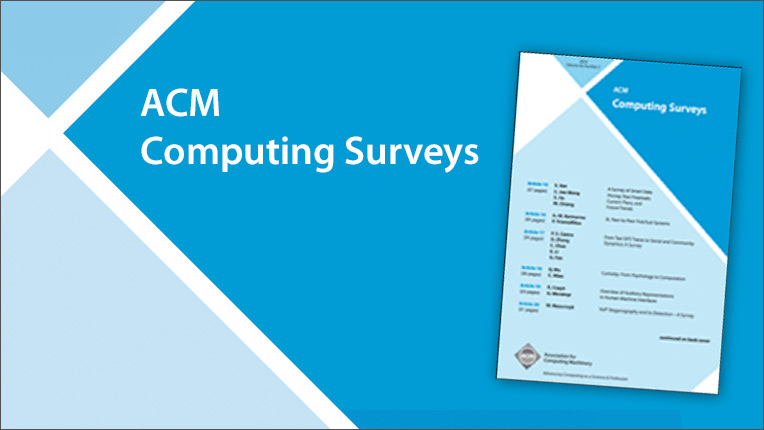
Due to the considerable growth in submissions and publication of ACM Computing Surveys (CSUR), the number of CSUR issues published yearly will increase from six to nine. The change will take effect with Volume 54 in 2022. CSUR's comprehensive, readable surveys and tutorial papers give guided tours through the literature and explain topics to those who seek to learn the basics of areas outside their specialties in an accessible way.
ACM Artifact Evaluation Badges Gain Traction
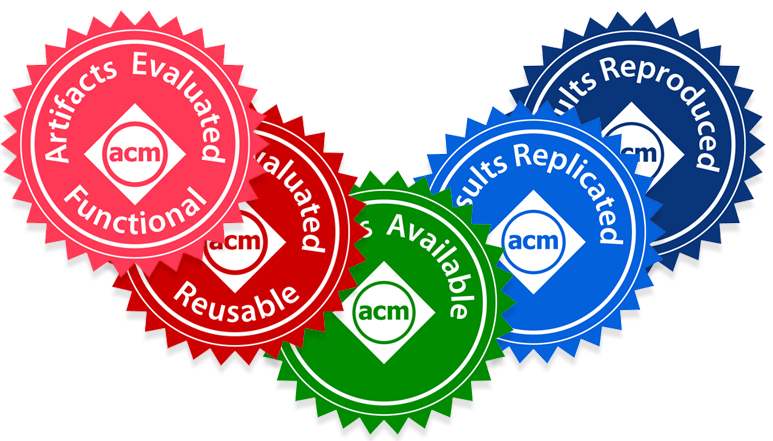
ACM has been working to promote the integrity of the research ecosystem by developing review processes that increase the likelihood that research results can be independently replicated and reproduced. There are several ways to achieve this, including independent reproduction of results during the review process for scholarly works or requiring that research artifacts (i.e., software systems, code, datasets, raw data, scripts, etc.) undergo a mandatory audit process.
Part of this initiative includes the establishment and use of badges related to artifact review of research articles published in ACM publications in the ACM Digital Library, and ensuring that the terminology used for these badges is consistent with terminology being used in the broader scientific research community. Toward this end, ACM worked closely with the National Information Standards Organization (NISO) to ensure that ACM badges have the same meaning as other badging schemes outside of computer science.
More information about ACM's artifact review and badging initiative can be found here. Please consult this website if you are an ACM Journal Editor-in-Chief or a Program Committee Chair for an ACM Conference or event and are interested in including research artifacts evaluation in your submission and peer review process.
More than 1,500 ACM published articles have participated in ACM's reproducibility initiative and have received one or more of ACM's badges, with this number steadily growing.
ACM has also received inquiries from non-ACM computing conferences and publications expressing interest in using our badges for their own events and publications. ACM views this as a very positive sign and encourages the use of our badges and scheme for ACM and non-ACM venues alike, provided these venues agree to the following requirements in writing:
- Commit in writing that they will apply the same criteria for evaluation and awarding of each ACM badge as provided on ACM's website.
- Follow ACM's branding and sub-branding guidelines for the use of ACM badging templates by non-ACM venues, which will be provided by ACM upon request.
- Provide proper attribution to ACM and NISO on their non-ACM websites.
- Make it clear on their non-ACM websites that while their organization is utilizing ACM's Artifact Evaluation Scheme and branded badges, ACM is not involved in the implementation or evaluation process in any way on behalf of their non-ACM venue.
- Provide ACM with a link to the non-ACM website where information about the organization's badging initiative is provided.
Once a non-ACM venue provides confirmation that the above requirements will be met, ACM will provide written confirmation granting permission to use ACM's badges and scheme.
If you have any questions about this process, please reach out to me at [email protected].
ACM TIST Seeking New Editor-in-Chief
ACM Transactions on Intelligent Systems and Technology (TIST) is seeking a new Editor-in-Chief. Nominations are due May 20. For more information please visit the TIST nominations page.
ACM Publications Welcome New Editors-in-Chief
ACM Transactions on Cyber-Physical Systems (TCPS) has named Chenyang Lu as Editor-in-Chief, for the term March 1, 2021 to February 29, 2024. Chenyang is an engineer and the Fullgraf Professor at Washington University in St. Louis, Missouri.
ACM Transactions on the Web (TWEB) has named Ryen White as Editor-in-Chief, for the term February 1, 2021 to January 31, 2024. Ryen is a Partner Researcher and Research Manager at Microsoft Research AI.
ACM Transactions on Autonomous and Adaptive Systems (TAAS) has named Valérie Issarny as Editor-in-Chief, for the term December 1, 2020 to November 30, 2023. Valérie is a Director of Research at the National Institute for Research in Digital Science and Technology (France).
ACM Transactions on Algorithms (TALG) has named Edith Cohen as Editor-in-Chief, for the term December 1, 2020 to November 30, 2023. Edith is a Research Scientist at Google in Mountain View, California and visiting professor at Tel Aviv University in Israel.
Association for Computing Machinery
1601 Broadway, 10th Floor, New York, NY 10019
Copyright © 2021, ACM, Inc. All rights reserved